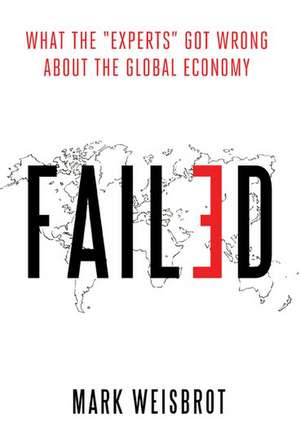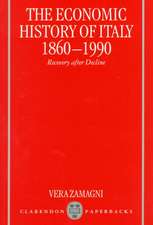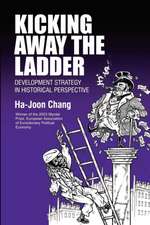Failed: What the "Experts" Got Wrong about the Global Economy
Autor Mark Weisbroten Limba Engleză Hardback – 26 noi 2015
Preț: 274.51 lei
Nou
Puncte Express: 412
Preț estimativ în valută:
52.53€ • 56.17$ • 43.80£
52.53€ • 56.17$ • 43.80£
Carte tipărită la comandă
Livrare economică 07-12 aprilie
Preluare comenzi: 021 569.72.76
Specificații
ISBN-13: 9780195170184
ISBN-10: 0195170180
Pagini: 312
Ilustrații: 12 line illustrations
Dimensiuni: 211 x 142 x 28 mm
Greutate: 0.45 kg
Editura: Oxford University Press
Colecția OUP USA
Locul publicării:New York, United States
ISBN-10: 0195170180
Pagini: 312
Ilustrații: 12 line illustrations
Dimensiuni: 211 x 142 x 28 mm
Greutate: 0.45 kg
Editura: Oxford University Press
Colecția OUP USA
Locul publicării:New York, United States
Recenzii
For those who wish to understand the global economy of the past generation, the shocking failures and impressive successes, this is the book to read. With careful scholarship and lucid analysis, Weisbrot reveals the pernicious effects of the neoliberal assault on the world's population, from wealthy and developed Europe to the global south, and exposes the dominant political-economic doctrines, rooted in a harsh attack on democracy and undermining of social policies that benefit the vast majority. He also shows how rejection of these doctrines has led to impressive achievements. All of this is consistent with actual economic history, if not prevailing illusion. The critique is harsh and incisive, but prospects are bright if the lessons of history and the logic of policy are viewed with care, as in this timely, authoritative, and very valuable study.
Mark Weisbrot demolishes the illusions of Europe and the IMF -- but also shows, by way of contrast, how it was that Argentina, Brazil, Bolivia, and Ecuador have brewed success from rebellion against the neoliberal project.
Weisbrot provides a fascinating tour of the destruction wrought by these 'economic experts' preaching financial liberalization, privatization, and austerity: from Spain to Greece and Argentina to Indonesia. As Weisbrot shows, other economists, policy makers, and governments have shown alternative paths to development that avoid these costly ideas. He concludes by arguing that 'the ideas that facilitated that regrettable failure remain influential, but these, too, will become increasingly less relevant in time. If this turns out to be true, it will be partly due to the excellent work that Weisbrot has contributed over many years to show the dismal failures of these ideas and to help develop more just and inclusive economic paths for countries to follow.
The International Monetary Fund, the European Central Bank, and neoliberal economics may have failed, but Mark Weisbrot has not. His demolition job on the economic policies that have led to misery for millions is comprehensive, long overdue and a resounding success.
As the author describes it in the introduction, this is a book about failed economic policies -- those of the Eurozone since 2008 and the failure of market reforms to reignite growth in low -- and middle-income countries in the last two decades of the twentieth century. But it is also a book about development successes -- and thus of alternatives to those failures -- notably that of China's state-led insertion into globalization, and Latin America with its several left-wing regimes over the past decade. It is a very important contribution to global debates by one of market (neoliberal) reforms' leading critics. It should be on the shelves of both defenders and critics of market reforms.
There are two types of economic history books: those that start with an ideological position and select facts as they please, and another that actually discusses what happened and why. Mark Weisbrot's newest book belongs to the second category. It takes you on a journey to the places and crises that, according to the neoliberal narrative, should have never happened -- the Asian financial meltdown, the Argentine depression and recovery, the interminable European austerity -- and for good measure adds a discussion of the most successful economy of the last 40 years, China, which stands out among the rest with its pragmatic and unusual economic policy mix. There are here lessons to be learned for the rich, emerging, and poor economies alike.
Weisbrot's book shatters conventional wisdoms about the meaning of the Eurozone crisis. In clear, accessible language, it advances a desperately-needed alternative interpretation of the contemporary global economy.
Mark Weisbrot is among that very small group of economists whose theorizing about the world actually matches the truth of the world. His new book, Failed , is an indispensable analysis of prevailing misconceptions, of the type once described by the great sociologist C. Wright Mills as 'crackpot realism,' a delusional 'style of mind' that 'justifies its false and feeble views as reality itself.' It is required reading for anyone seeking to explain contemporary global politics.
Compelling
Mark Weisbrot demolishes the illusions of Europe and the IMF -- but also shows, by way of contrast, how it was that Argentina, Brazil, Bolivia, and Ecuador have brewed success from rebellion against the neoliberal project.
Weisbrot provides a fascinating tour of the destruction wrought by these 'economic experts' preaching financial liberalization, privatization, and austerity: from Spain to Greece and Argentina to Indonesia. As Weisbrot shows, other economists, policy makers, and governments have shown alternative paths to development that avoid these costly ideas. He concludes by arguing that 'the ideas that facilitated that regrettable failure remain influential, but these, too, will become increasingly less relevant in time. If this turns out to be true, it will be partly due to the excellent work that Weisbrot has contributed over many years to show the dismal failures of these ideas and to help develop more just and inclusive economic paths for countries to follow.
The International Monetary Fund, the European Central Bank, and neoliberal economics may have failed, but Mark Weisbrot has not. His demolition job on the economic policies that have led to misery for millions is comprehensive, long overdue and a resounding success.
As the author describes it in the introduction, this is a book about failed economic policies -- those of the Eurozone since 2008 and the failure of market reforms to reignite growth in low -- and middle-income countries in the last two decades of the twentieth century. But it is also a book about development successes -- and thus of alternatives to those failures -- notably that of China's state-led insertion into globalization, and Latin America with its several left-wing regimes over the past decade. It is a very important contribution to global debates by one of market (neoliberal) reforms' leading critics. It should be on the shelves of both defenders and critics of market reforms.
There are two types of economic history books: those that start with an ideological position and select facts as they please, and another that actually discusses what happened and why. Mark Weisbrot's newest book belongs to the second category. It takes you on a journey to the places and crises that, according to the neoliberal narrative, should have never happened -- the Asian financial meltdown, the Argentine depression and recovery, the interminable European austerity -- and for good measure adds a discussion of the most successful economy of the last 40 years, China, which stands out among the rest with its pragmatic and unusual economic policy mix. There are here lessons to be learned for the rich, emerging, and poor economies alike.
Weisbrot's book shatters conventional wisdoms about the meaning of the Eurozone crisis. In clear, accessible language, it advances a desperately-needed alternative interpretation of the contemporary global economy.
Mark Weisbrot is among that very small group of economists whose theorizing about the world actually matches the truth of the world. His new book, Failed , is an indispensable analysis of prevailing misconceptions, of the type once described by the great sociologist C. Wright Mills as 'crackpot realism,' a delusional 'style of mind' that 'justifies its false and feeble views as reality itself.' It is required reading for anyone seeking to explain contemporary global politics.
Compelling
Notă biografică
Mark Weisbrot is Co-Director of the Center for Economic and Policy Research in Washington, D.C. He received his Ph.D. in economics from the University of Michigan. He is co-author, with Dean Baker, of Social Security: The Phony Crisis, and has written numerous research papers on economic issues and policy. His columns, commentary, and op-eds have appeared in almost all major U.S. newspapers, and in many in other countries, and he appears frequently on national and international television and radio programs. He is also president of Just Foreign Policy.











